Efficient dermatology pathology is crucial for improved patient outcomes. Inefficient data management can lead to significant delays in diagnosing each patient’s condition, starting treatment, and making changes if initial treatments do not work as well as the patient’s medical team hoped. It can also lead to misinterpreting lab results and potential misdiagnoses, reducing patient care quality. However, a quality lab information system (LIS) can bridge these gaps, enhancing patient outcomes through streamlined data, custom reports, and other cutting-edge features.
The Power of Data in Dermatology Pathology
Accurate data decreases the chances of an inaccurate diagnosis, a crucial waypoint in a patient’s journey. Getting the diagnosis right ensures patients receive the proper treatment as quickly as possible. Many skin diseases, cancers, and other conditions can look similar based solely on visual inspections by even the most qualified healthcare professionals. The only way to overcome this limitation is to gather and analyze data via laboratory results. Integrating these findings with patients’ comprehensive health histories can assist medical professionals in reaching the most accurate conclusions possible while minimizing misdiagnoses or inconclusive test results. Diagnosing the condition is just the beginning; data will continue to play a crucial role in monitoring the progress of treatments and confirming whether the patient’s condition is improving. Even once treatment concludes, data can contribute to future research to develop better diagnostic tests and treatment options for specific dermatological conditions.
While data is essential in improving diagnoses and treatments, keeping a vast amount of data secure and organized can be challenging. In contrast with an LIS, traditional data storage options tend to be more likely to experience security concerns and are less likely to maintain adherence to shifting industry regulations. Keeping up with changing data and the sheer volume of information most healthcare facilities manage can also be complex. Given these new challenges, choosing a modern data management system is a much better option for ensuring that your team can keep sensitive patient data confidential and quickly locate each piece of information when needed.
How a Lab Information System (LIS) Transforms the Process
A laboratory information system, or LIS, is not just a generic data management tool. It can play a key role in improving the quality of dermatological pathology services and your facility’s overall level of care. LIS software is designed to store, process, and manage various types of patient data in dermatology more efficiently and securely than older data management alternatives. These newer programs allow lab technicians to create better samples that are easier for clinicians to interpret, thus resulting in more accurate diagnoses.
- Automating data entry to reduce errors and improve the quality of data analysis results.
- Providing a significantly more secure alternative to older methods for organizing and storing images and other sensitive medical data.
- Generating a wide range of highly customizable reports contributing to research, quality assurance, and other aspects of patients’ overall experience interacting with your team.
Custom Reports: The Key to Improved Patient Outcomes
Every patient is unique, and the custom reports an LIS makes possible allow your dermatology practice to create a more personalized approach to providing the best possible care for each patient. With custom reports, physicians and lab techs can gather significantly more targeted information for each case to create the most comprehensive picture of each patient’s symptoms, medical history, and other factors. This information can lead to faster diagnosis turnaround times, reducing the lag between initial appointments and initiating treatment, leading to the best possible outcomes for your patients.
Using a high-quality LIS can significantly impact every stage of the treatment process. It provides more options for tracking patient progress and enables healthcare professionals to see how well treatments work. This makes it easier to decide whether trying a different treatment option might result in better outcomes for the patient. LIS technology also offers healthcare professionals various collaboration options that may be challenging or impossible when using an older organizational system. This allows a patient’s medical team to share data and ideas, ensuring no key details are missed.
Choose Psyche Systems to Improve Your Patients’ Outcomes Through Quality Dermatology Pathology Reports
At Psyche Systems, we prioritize providing our customers with the most modern and cutting-edge data management technology available to get the most out of the data they collect and keep it as secure as possible. Our lab information system technology is crucial in improving dermatology pathology and a wide range of other specializations by helping medical facilities stay organized and use the data they gather in as many ways as possible to benefit individual patients and the future outlook for the practice specialization overall. Contact us today to learn how using an LIS can improve nearly every aspect of patient care, plus best practices on how to get started!

